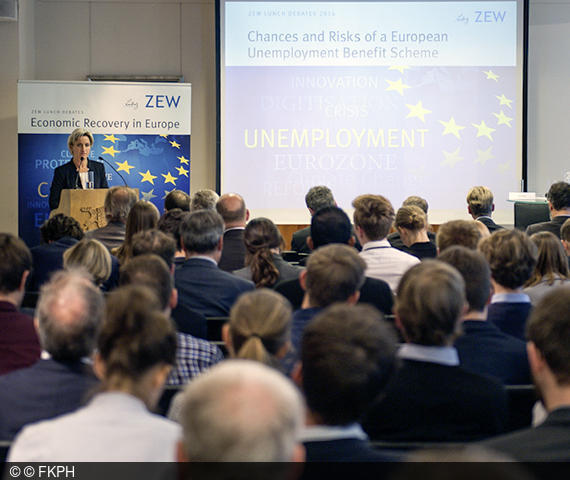European Unemployment Benefit Scheme Offers Both Chances and Risks for the Eurozone
ZEW Lunch Debate in BrusselsThe euro crisis has reignited the debate about deeper fiscal integration in the European Economic and Monetary Union (EMU). In this context, the idea of a common unemployment insurance system (EMU-UI) is the subject of controversial discussion. Such an automatic stabiliser could help euro countries to absorb asymmetric economic shocks in the euro area. In what way, however, is the implementation of a common unemployment benefit scheme feasible for euro countries? And what pre-conditions need to be met in order to avoid permanent transfers across Member States and moral hazard? These were some of the questions discussed at the Lunch Debate "Chances and Risks of a European Benefit Scheme", organised by the Centre for European Economic Research (ZEW) at the Representation of the State of Baden-Württemberg to the European Union in Brussels on 20 October 2016.
The event opened with an introductory note by Dr. Nicole Hoffmeister-Kraut, Minister of Economic Affairs, Labour and Housing of the State of Baden-Württemberg. Given the difficult situation of the EU, she urged for all available stabilization mechanisms to be reviewed in terms of efficacy and feasibility – including a European unemployment benefit scheme.<o:p></o:p>
From a scientific perspective, Dr. Mathias Dolls, deputy head of ZEW's Research Group "International Distribution and Redistribution", added that the aim of EMU-UI is to improve the Monetary Union's economic stability and to strengthen the institutional architecture in the long term. Instead of replacing national UI systems altogether, the EMU-UI would guarantee certain minimum standards. Furthermore, the system would only cover short-term (rather than structural) unemployment.<o:p></o:p>
Net contributors and net recipients alternate<o:p></o:p>
Using results of his own research, Mathias Dolls explained that a common UI shows altogether countercyclical effects. In the period covered by the study, from 2000 to 2013, the average budget would have amounted to roughly 47 billion euros per year. The study revealed that the majority of Member States changed their status from net contributors to net recipient, and vice versa, throughout this period.<o:p></o:p>
László Andor, PhD, former EU Commissioner for Employment, Social Affairs and Inclusion, and professor for economic policy at the Corvinus University in Budapest; Fabien Dell, PhD, member of EU Commissioner for Economic and Financial Affairs Pierre Moscovici’s cabinet; as well as Torsten Arnswald, head of the Fiscal Policy Division in the German Federal Ministry of Finance, joined Mathias Dolls in the panel discussion. Maithreyi Seetharaman, an economics journalist and co-chair of Fortune Magazine’s "Most Powerful Women International", moderated the lively and controversial debate.<o:p></o:p>
EU unemployment benefit scheme needs complementing policy measures<o:p></o:p>
The event gathered about 100 representatives of the EU Commission and the European Parliament, as well as guests from the realms of academia, industry, non-governmental organisations and civil society, many of which actively participated in the exchange of ideas. Key questions included whether the harmonization of national UI systems requires a prior approximation of labour market structures, and whether potential disincentive effects can be avoided by a common system. Mathias Dolls proposed the introduction of risk-related insurance premiums and suggested that participation in a common unemployment benefit scheme should only be possible for Member States which comply with the stability criteria and which are willing to embrace reform.<o:p></o:p>
In addition, the panel discussed the extent to which it is possible for EMU-UI to take into account prevailing differences among individual Member States, such as Portugal and the Netherlands. Given the pressing issue of unemployment, these aspects will certainly remain on the political and economic agenda of the EU long after the ZEW Lunch Debate.<o:p></o:p>
